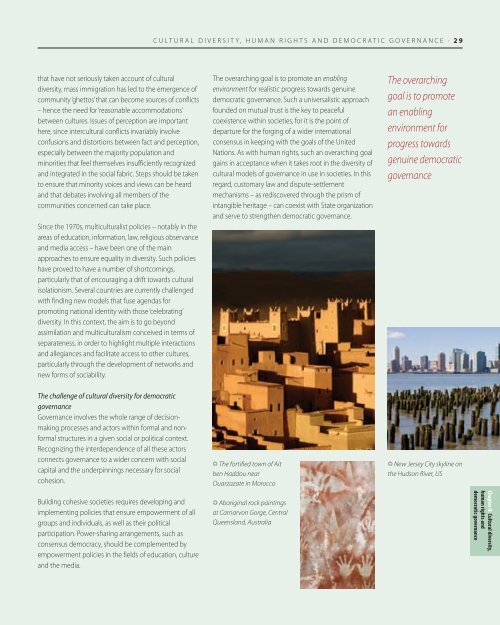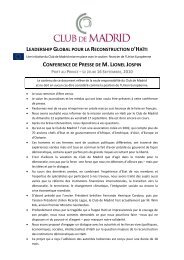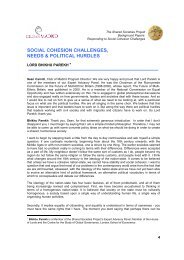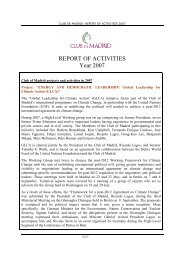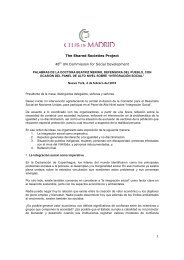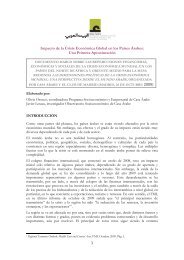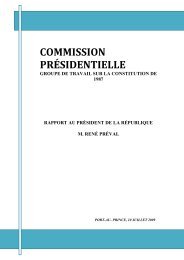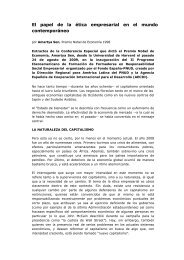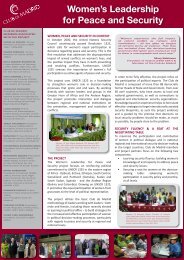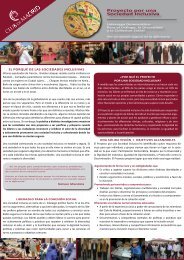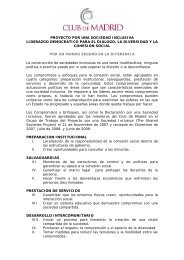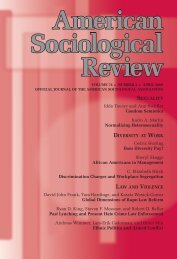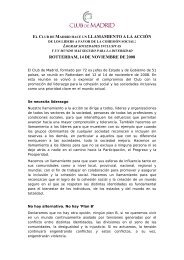Investing cultural diversity and intercultural dialogue - Business and ...
Investing cultural diversity and intercultural dialogue - Business and ...
Investing cultural diversity and intercultural dialogue - Business and ...
You also want an ePaper? Increase the reach of your titles
YUMPU automatically turns print PDFs into web optimized ePapers that Google loves.
CULTURAL DIVERSITY, HUMAN RIGHTS AND DEMOCRATIC GOVERNANCE . 29<br />
that have not seriously taken account of <strong>cultural</strong><br />
<strong>diversity</strong>, mass immigration has led to the emergence of<br />
community ‘ghettos’ that can become sources of conflicts<br />
– hence the need for ‘reasonable accommodations’<br />
between cultures. Issues of perception are important<br />
here, since inter<strong>cultural</strong> conflicts invariably involve<br />
confusions <strong>and</strong> distortions between fact <strong>and</strong> perception,<br />
especially between the majority population <strong>and</strong><br />
minorities that feel themselves insufficiently recognized<br />
<strong>and</strong> integrated in the social fabric. Steps should be taken<br />
to ensure that minority voices <strong>and</strong> views can be heard<br />
<strong>and</strong> that debates involving all members of the<br />
communities concerned can take place.<br />
Since the 1970s, multi<strong>cultural</strong>ist policies – notably in the<br />
areas of education, information, law, religious observance<br />
<strong>and</strong> media access – have been one of the main<br />
approaches to ensure equality in <strong>diversity</strong>. Such policies<br />
have proved to have a number of shortcomings,<br />
particularly that of encouraging a drift towards <strong>cultural</strong><br />
isolationism. Several countries are currently challenged<br />
with finding new models that fuse agendas for<br />
promoting national identity with those ‘celebrating’<br />
<strong>diversity</strong>. In this context, the aim is to go beyond<br />
assimilation <strong>and</strong> multi<strong>cultural</strong>ism conceived in terms of<br />
separateness, in order to highlight multiple interactions<br />
<strong>and</strong> allegiances <strong>and</strong> facilitate access to other cultures,<br />
particularly through the development of networks <strong>and</strong><br />
new forms of sociability.<br />
The challenge of <strong>cultural</strong> <strong>diversity</strong> for democratic<br />
governance<br />
Governance involves the whole range of decisionmaking<br />
processes <strong>and</strong> actors within formal <strong>and</strong> nonformal<br />
structures in a given social or political context.<br />
Recognizing the interdependence of all these actors<br />
connects governance to a wider concern with social<br />
capital <strong>and</strong> the underpinnings necessary for social<br />
cohesion.<br />
Building cohesive societies requires developing <strong>and</strong><br />
implementing policies that ensure empowerment of all<br />
groups <strong>and</strong> individuals, as well as their political<br />
participation. Power-sharing arrangements, such as<br />
consensus democracy, should be complemented by<br />
empowerment policies in the fields of education, culture<br />
<strong>and</strong> the media.<br />
The overarching goal is to promote an enabling<br />
environment for realistic progress towards genuine<br />
democratic governance. Such a universalistic approach<br />
founded on mutual trust is the key to peaceful<br />
coexistence within societies, for it is the point of<br />
departure for the forging of a wider international<br />
consensus in keeping with the goals of the United<br />
Nations. As with human rights, such an overarching goal<br />
gains in acceptance when it takes root in the <strong>diversity</strong> of<br />
<strong>cultural</strong> models of governance in use in societies. In this<br />
regard, customary law <strong>and</strong> dispute-settlement<br />
mechanisms – as rediscovered through the prism of<br />
intangible heritage – can coexist with State organization<br />
<strong>and</strong> serve to strengthen democratic governance.<br />
L The fortified town of Ait<br />
ben Haddou near<br />
Ouarzazate in Morocco<br />
I Aboriginal rock paintings<br />
at Carnarvon Gorge, Central<br />
Queensl<strong>and</strong>, Australia<br />
The overarching<br />
goal is to promote<br />
an enabling<br />
environment for<br />
progress towards<br />
genuine democratic<br />
governance<br />
L New Jersey City skyline on<br />
the Hudson River, US<br />
Chapter 8: Cultural <strong>diversity</strong>,<br />
human rights <strong>and</strong><br />
democratic governance


